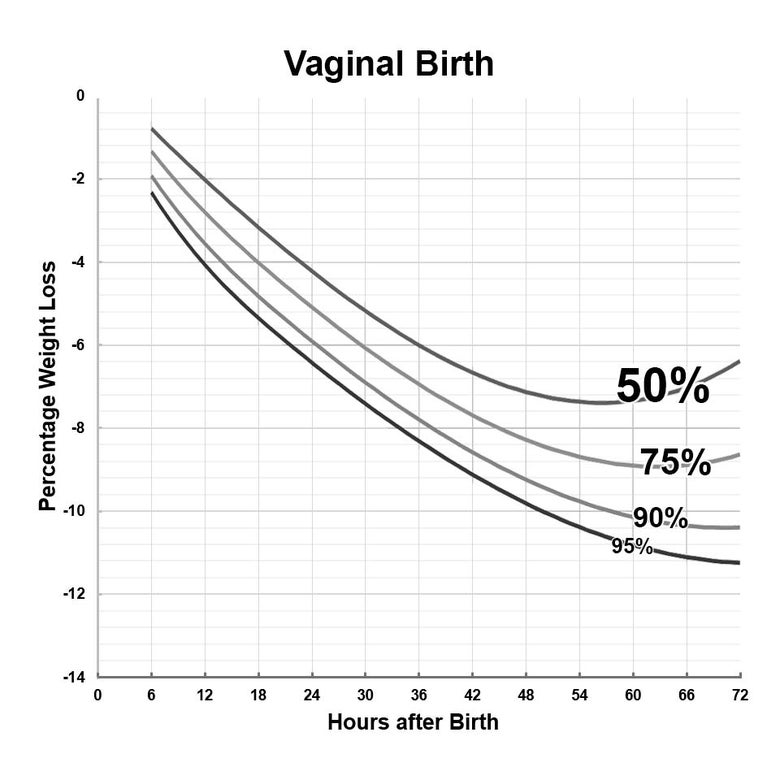Percent of Babies in Us With Low Birth Weights
Nigh All Infants Lose Weight After They're Born. And so Why Do Hospitals Focus on It So Obsessively?

It'southward ridiculous how many expectations and conventions be effectually childbirth and parenting. Only over the grade of writing two books most this time of life, I've come to appreciate that at that place are some things you lot merely tin not anticipate: things people don't talk almost, sometimes considering they are distressing, sometimes uncomfortable, sometimes only evidently weird. I recollect we should talk most them—and, more than that, we should utilise data to really understand them. (I'm an economist; I beloved information). Acknowledging the data can often relieve a lot of the pressure on parents, either by reflecting experiences that experience isolating in the moment or by presenting us with a greater range of choices than we might accept thought we had. In that spirit, I have a series in Slate this week near how data helps illuminate childbirth and parenting's most underdiscussed topics.
My start child, Penelope, was built-in at 6 a.thou. As a result, our insurance covered two nights in the infirmary. On our second night—when my hubby had gone home to balance and gear up the firm for our render—the nurses took Penelope for some tests and returned her at 2 a.m. I was sleeping. The nurse switched on the light and rolled the bassinet in; in addition to Penelope, the bassinet had a niggling sign: Breastfeeding Only.
"Nosotros weighed her," the nurse said, "and she'southward lost 11 percent of her body weight. Our limit is 10 pct, so you lot'll accept to outset supplementing with formula. If you don't, you probably won't go to take her home tomorrow." I felt ascent panic—non take her home?—and also some confusion. ten percent versus eleven percent? These seemed pretty similar—was that one percentage really enough to foreclose an otherwise salubrious baby from coming home?
Evidently, yous desire your infant to thrive, and weight is an important metric. But many new parents are not expecting the tremendous focus doctors and hospital staff place on babe weight proceeds or loss. If y'all have happily given birth to a good for you baby after a relatively uneventful commitment, the vast bulk of your hospital conversations volition now revolve around the infant's feeding and weight. That might sound like a fine thought, but remember this is not a moment you are at your near laissez-faire. When yous're merely postpartum and trying to breastfeed for the first time, information technology can exist incredibly tense. It can feel like you are declining—yous did such a great task growing this babe inside you, and now that it's out, y'all are a failure. (You're not!! That'due south simply how it feels.)
Here is the first matter to know: nearly all infants lose weight after nativity, and those who are breastfed lose even more. The mechanisms for this are well understood. In the womb, your baby is getting nutrients and arresting calories through the umbilical cord. Once the infant is out, he has to figure out how to consume. It is complicated (for both of you), and in the start few days, yous won't still have a lot of milk.
Baby weight is monitored pretty carefully in the infirmary. Every 12 hours or so, they'll weigh the baby and possibly come back to report change in weight to you. Broadly, the reasons for weight monitoring are good ones. Weight loss is not an outcome in and of itself, but excessive weight loss can indicate a problem with feeding—that breastfeeding isn't working successfully, for example. This tin can be a clue that newborns aren't getting enough liquid, which puts them at risk for dehydration. Dehydrated babies may so struggle more to feed, and you get a downward screw. In principle this tin can have severe consequences, just these are rare.
Monitoring weight is nigh catching possible problems early, when you can fix them, and constructive monitoring requires understanding how much weight newborns typically lose. Generally, we want to consider something a problem if it's way outside the normal range. If most babies lose ten per centum of their weight, and then we shouldn't worry when that happens. Nothing in biology tells you that a infant losing 10 percent of its nascency weight is a trigger for problems.
Figuring out the range of normal newborn weight loss requires data that, until recently, hasn't been that easy to come by. In 2015, however, a set of authors published a really prissy paper in the journal Pediatrics that used data from infirmary records on 160,000 births to graph out the weight loss amongst breastfed infants in the hours after birth.

The graph below shows a version of this study'southward results for breastfed babies who were born vaginally. The horizontal axis shows infant age in hours; the vertical centrality shows the percentage weight loss. The lines indicate how much this varies. The top line, for example, shows the weight loss path over time for the infant at the 50th percentile of weight loss.
From these figures, you can read both the boilerplate weight loss and the range. For case, at 48 hours, the average infant born vaginally has lost 7 pct of torso weight, and five percent of infants have lost more than x percent. For at least some infants, weight loss continues through 72 hours.
On average, babies born past caesarean section lose a bit more weight than those born vaginally, probable because breast milk is usually a bit more delayed subsequently a C-section. Babies who are formula-fed typically do non lose much at all (since formula doesn't need fourth dimension to come in).
When I had Penelope, the rule in the infirmary was that if babies lose more than 10 percentage of their body weight, you supplement. But you can encounter from the graphs that whether this is a reasonable cutoff depends tremendously on when the measurement is taken and the babe's item circumstances. At 72 hours, x percent weight loss is inside the normal range. At 12 hours, it would exist a serious outlier. The authors of this paper created a very overnice website where y'all tin enter the fourth dimension of birth of your kid, method of nascency, method of feeding, birth weight, and current weight, and learn where your baby is in the distribution.
If you lot practice observe, every bit I did, that your infant has gone over the weight loss limits, what should you do? Typically, hospitals will recommend supplementing with formula for a short menstruum. Supplementation would rarely be recommended before 48 or 72 hours, so it'southward useful to pay attending to your baby's weight before that. If she'due south losing weight quickly, trying to figure out why may make sense.
A final note: The major concern about weight loss is that it signals dehydration. Simply this is also something you can monitor straight. If your baby is peeing with some frequency and does not have a dry out tongue, in that location's a very expert chance he'south non dehydrated. Conversely, if you lot do run across these signs, supplementation may exist a good idea even if there isn't too much weight loss.
The extensive focus on weight and feeding is enough to really scare a lot of new parents—myself included. Only the data here should exist reassuring. Some pretty substantial weight loss is totally normal, even expected. So don't be surprised, and don't panic. Fifty-fifty when yous're trying and failing to feed an babe at 2 a.m.

Slate has relationships with various online retailers. If you buy something through our links, Slate may earn an affiliate commission. We update links when possible, just notation that deals can expire and all prices are subject to change. All prices were up to date at the fourth dimension of publication.
kissingerloneve77.blogspot.com
Source: https://slate.com/human-interest/2019/04/cribsheet-newborn-infant-birth-weight.html
0 Response to "Percent of Babies in Us With Low Birth Weights"
Post a Comment